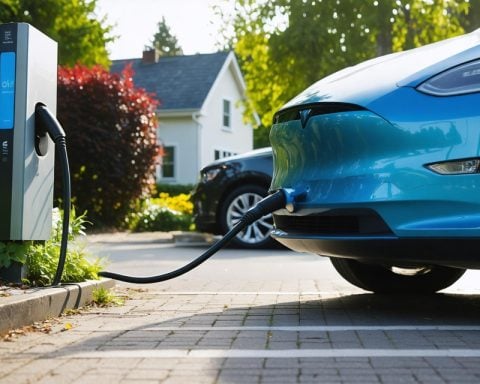Michigan State Police Tests Electric Mustang for Patrol Duties
The Michigan State Police has made a groundbreaking decision by introducing the all-electric 2024 Ford Mustang Mach-E into its patrol fleet. This initiative kicks off a significant evaluation period where law enforcement performance will be meticulously analyzed, potentially shaping Ford’s future offerings to police departments across the country.
Engaged in protecting state-owned facilities in Lansing, the police’s State Security Operations Section will be the first to incorporate this innovative vehicle. The director of the Michigan State Police expressed enthusiasm for the project, emphasizing the opportunity to assess how an electric vehicle performs in practical patrol situations. Given that officers in this unit operate within city limits and cover fewer miles, the Mach-E’s performance in this controlled environment will provide valuable insights.
Ford’s commitment to electric vehicles is evident as the company collaborates with the state police through comprehensive testing to enhance their police vehicle program. Historical data shows Ford’s dominance in creating robust police vehicles, dating back to the early 1900s.
With a purchase price of $39,600, the Mach-E represents potential savings and operational efficiency for the Michigan State Police. The Precision Driving Unit, known for its annual vehicle evaluations, will determine if electric models could become standard in law enforcement fleets nationwide, marking a pivotal shift in policing strategies.
Implications of Electric Patrol Vehicles on Society and Environment
The introduction of electric vehicles (EVs) into law enforcement, notably through the Michigan State Police’s trial of the Ford Mustang Mach-E, signals a significant transformation in contemporary policing dynamics and broader societal practices. As police departments explore alternative fuel sources, this shift reflects an increasing recognition of sustainability as a central tenet of governmental operations. The adoption of EVs could not only lower fuel costs but also reduce greenhouse gas emissions, contributing to a greener future while simultaneously addressing public concerns about climate change.
Cultural perceptions of law enforcement might evolve alongside these fleet changes. Communities may respond positively to police departments emphasizing environmental responsibility, thus fostering greater trust and promoting community engagement. This instance highlights how operational changes can resonate far beyond their original intent, influencing societal values around efficiency and environmental stewardship.
From an economic perspective, the proliferation of EVs within law enforcement might stimulate growth in sectors like electric vehicle infrastructure. With technological advancements anticipated in battery life and charging solutions, police departments could lead the way for other municipal services to adopt similar vehicles. The potential for mass adoption could fundamentally alter the global auto market as demand increases for performance-fueled, sustainable vehicles.
Moreover, the potential challenges associated with transitioning to electric fleets, such as charging infrastructure and maintenance, signal a need for comprehensive planning. Long-term, the Michigan State Police’s initiative could act as a catalyst for regulatory changes in automotive manufacturing, prompting auto manufacturers to pivot faster toward sustainable practices that align with global emissions targets. Ultimately, this transition reflects a broader trend, where the intersection of public service, economic necessity, and environmental responsibility shapes the future landscape of both policing and societal norms.
Revolutionizing Policing: The Future of Electric Vehicles in Law Enforcement
Michigan State Police Embraces Electric Vehicle Technology
In a historic move towards sustainability and modern policing, the Michigan State Police (MSP) has initiated a groundbreaking trial of the 2024 Ford Mustang Mach-E as part of its patrol fleet. This initiative marks a significant evaluation of electric vehicle performance in law enforcement, setting the stage for potential widespread adoption across police departments in the United States.
Key Features of the Ford Mustang Mach-E
The Ford Mustang Mach-E stands out in the electric vehicle market due to several key features:
– All-Electric Powertrain: The Mach-E offers a fully electric driving experience, reducing emissions and operational costs.
– Performance: With quick acceleration and performance capabilities, it is well-suited for urban patrol situations.
– Technology Integration: Equipped with advanced navigation and communication systems, the Mach-E ensures officers remain connected and efficient during patrols.
Pros and Cons of Electric Police Vehicles
Pros:
– Reduced Fuel Costs: Electric vehicles can significantly lower fuel expenses compared to traditional gas-powered cars.
– Lower Maintenance: Electric engines generally require less maintenance, saving money in the long run.
– Environmental Impact: Using electric vehicles helps reduce carbon footprints and promote sustainable practices within law enforcement.
Cons:
– Range Limitations: Depending on usage, electric vehicles may face limitations in range, especially in rural areas.
– Infrastructure Needs: Police departments may require investment in charging infrastructure to support an electric fleet.
– Performance under Extreme Conditions: Electric vehicles need thorough testing to ensure reliability under various weather conditions and high-stress scenarios.
Market Analysis and Future Trends
As governments and organizations increasingly prioritize sustainability, the integration of electric vehicles in law enforcement may see accelerated growth. Industry experts predict a significant shift towards electric models in police fleets over the next decade, influenced by advancements in battery technology and infrastructure development.
Use Cases for Electric Police Vehicles
Electric vehicles like the Mustang Mach-E may be particularly suitable for:
– Urban Patrols: Ideal for city limits where traffic congestion often restricts vehicle range.
– Community Engagement: Officers can engage with local communities while promoting eco-friendly initiatives.
– Event Security: Efficient for temporary assignments where electric charging stations can be configured in event locations.
Pricing and Specifications
The Ford Mustang Mach-E is offered at a competitive starting price of $39,600, presenting financial advantages to law enforcement agencies considering the transition to electric fleets. The vehicle’s specifications include:
– EPA-estimated range: Up to 300 miles on a single charge
– Performance: 0-60 mph in approximately 3.5 seconds (depending on the model)
– Cargo space: Over 29 cubic feet with the rear seats up
Conclusion
The Michigan State Police’s adoption of the Ford Mustang Mach-E is poised to lead to significant innovations in policing strategies, paving the way for more sustainable, efficient, and adaptable law enforcement practices. As this evaluation continues, the insights gathered will be instrumental in guiding the future of police vehicle fleets nationwide.
For more information about innovative policing strategies, visit Michigan.gov.













